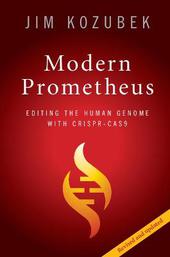
|
Modern Prometheus: Editing the Human Genome with Crispr-Cas9
Paperback / softback
Main Details
| Title |
Modern Prometheus: Editing the Human Genome with Crispr-Cas9
|
| Authors and Contributors |
By (author) James Kozubek
|
| Physical Properties |
| Format:Paperback / softback | | Pages:474 | | Dimensions(mm): Height 228,Width 153 |
|
| Category/Genre | Genetics (non-medical)
Genetic engineering |
|---|
| ISBN/Barcode |
9781108454629
|
| Classifications | Dewey:610.28 |
|---|
| Audience | | General | | Professional & Vocational | |
|---|
| Edition |
Revised edition
|
| Illustrations |
Worked examples or Exercises
|
|
Publishing Details |
| Publisher |
Cambridge University Press
|
| Imprint |
Cambridge University Press
|
| Publication Date |
26 April 2018 |
| Publication Country |
United Kingdom
|
Description
Would you change your genes if you could? As we confront the 'industrial revolution of the genome', the recent discoveries of Crispr-Cas9 technologies are offering, for the first time, cheap and effective methods for editing the human genome. This opens up startling new opportunities as well as significant ethical uncertainty. Tracing events across a fifty-year period, from the first gene splicing techniques to the present day, this is the story of gene editing - the science, the impact and the potential. Kozubek weaves together the fascinating stories of many of the scientists involved in the development of gene editing technology. Along the way, he demystifies how the technology really works and provides vivid and thought-provoking reflections on the continuing ethical debate. This updated paperback edition contains all the very latest on the patent battle over Crisp and the applications of Crispr technology in agriculture and medicine.
Author Biography
Jim Kozubek is a data scientist living in Cambridge, Massachusetts. His science writing has appeared in The Atlantic, Scientific American, New Scientist, the Los Angeles Review of Books, Time, Wired, Aeon, Nautilus, Undark, The Boston Globe, STAT and the Georgetown Journal of International Affairs.
Reviews'Over the last sixty years the vast enterprise of experimental biology has taken the world from complete ignorance of how complex organisms are created to a very detailed knowledge of the processes involved. Now we are entering a world in which we can manipulate these processes, even modifying the heredity of our species and all others. James Kozubek tells the story of how we came to this knowledge in a carefully woven fabric of presentation, starting with the most recent events and then delving back into the history. He focuses on the remarkable personalities involved and the controversies that have complicated the discovery process. It is a wonderful, rewarding and easily read book.' David Baltimore, California Institute of Technology '... as eye-witness to a revolution in reading and writing our own genomes, [Kozubek] has done a truly remarkable job of getting the nuances right, while dodging through the minefields between enthusiasm and easy dismissal. Provides a rich tapestry of insights into the scientific discovery, technology development and applications to many agricultural, environmental and medical problems which should matter deeply to all readers.' George Church, Harvard University 'Kozubek ... gives the general reader a solid introduction to the current state of affairs, as seen by its creators and those who are using it in research and commerce.' George J. Annas, Science 'as eye-witness to a revolution in reading and writing our own genomes, [Kozubek] has done a truly remarkable job of getting the nuances right, while dodging through the minefields between enthusiasm and easy dismissal. Provides a rich tapestry of insights into the scientific discovery, technology development and applications to many agricultural, environmental and medical problems which should matter deeply to all readers.' George Church, Harvard University" 'Kozubek gives the general reader a solid introduction to the current state of affairs, as seen by its creators and those who are using it in research and commerce.' George J. Annas, Science" 'Over the last 60 years the vast enterprise of experimental biology has taken the world from complete ignorance of how complex organisms are created to a very detailed knowledge of the processes involved. Now we are entering a world in which we can manipulate these processes, even modifying the heredity of our species and all others. James Kozubek tells the story of how we came to this knowledge in a carefully woven fabric of presentation, starting with the most recent events and then delving back into the history. He focuses on the remarkable personalities involved and the controversies that have complicated the discovery process. It is a wonderful, rewarding and easily read book.' David Baltimore, California Institute of Technology Advance praise: ' as eye-witness to a revolution in reading and writing our own genomes, [Kozubek] has done a truly remarkable job of getting the nuances right, while dodging through the minefields between enthusiasm and easy dismissal. Provides a rich tapestry of insights into the scientific discovery, technology development and applications.' George Church, Harvard University" Advance praise: 'Kozubek gives the general reader a solid introduction to the current state of affairs, as seen by its creators and those who are using it in research and commerce.' George J. Annas, Science" Advance praise: 'Over the last 60 years the vast enterprise of experimental biology has taken the world from complete ignorance of how complex organisms are created to a very detailed knowledge of the processes involved. Now we are entering a world in which we can manipulate these processes, even modifying the heredity of our species and all others. James Kozubek tells the story of how we came to this knowledge in a carefully woven fabric of presentation, starting with the most recent events and then delving back into the history. He focuses on the remarkable personalities involved and the controversies that have complicated the discovery process. It is a wonderful, rewarding and easily read book.' David Baltimore, California Institute of Technology
|